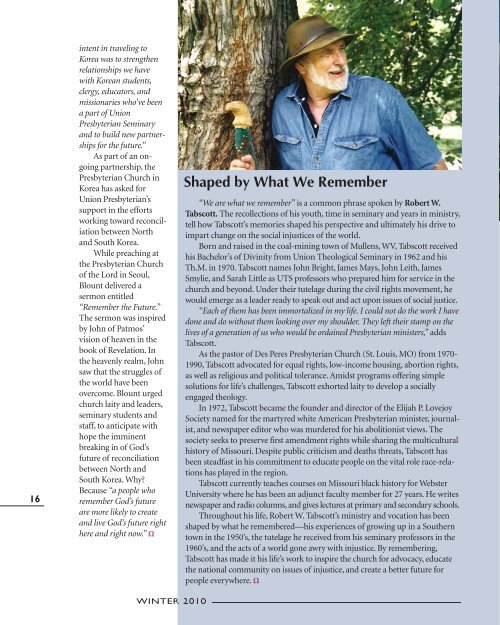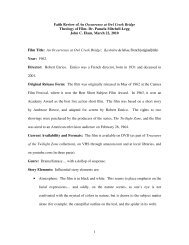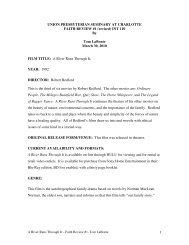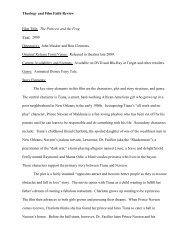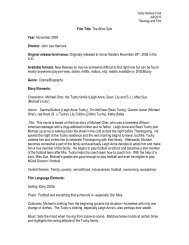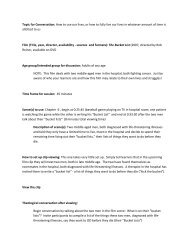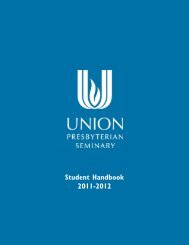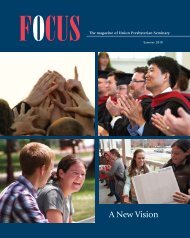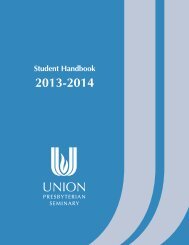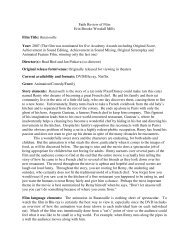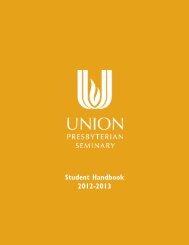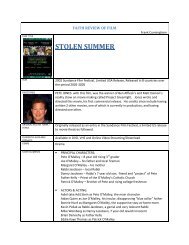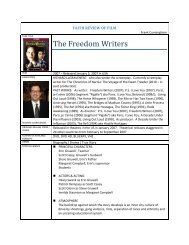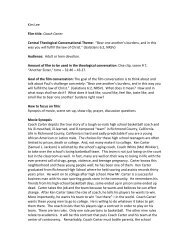Winter 2010 - Union Presbyterian Seminary
Winter 2010 - Union Presbyterian Seminary
Winter 2010 - Union Presbyterian Seminary
Create successful ePaper yourself
Turn your PDF publications into a flip-book with our unique Google optimized e-Paper software.
16<br />
intent in traveling to<br />
Korea was to strengthen<br />
relationships we have<br />
with Korean students,<br />
clergy, educators, and<br />
missionaries who’ve been<br />
a part of <strong>Union</strong><br />
<strong>Presbyterian</strong> <strong>Seminary</strong><br />
and to build new partnerships<br />
for the future.”<br />
As part of an ongoing<br />
partnership, the<br />
<strong>Presbyterian</strong> Church in<br />
Korea has asked for<br />
<strong>Union</strong> <strong>Presbyterian</strong>’s<br />
support in the efforts<br />
working toward reconciliation<br />
between North<br />
and South Korea.<br />
While preaching at<br />
the <strong>Presbyterian</strong> Church<br />
of the Lord in Seoul,<br />
Blount delivered a<br />
sermon entitled<br />
“Remember the Future.”<br />
The sermon was inspired<br />
by John of Patmos’<br />
vision of heaven in the<br />
book of Revelation. In<br />
the heavenly realm, John<br />
saw that the struggles of<br />
the world have been<br />
overcome. Blount urged<br />
church laity and leaders,<br />
seminary students and<br />
staff, to anticipate with<br />
hope the imminent<br />
breaking in of God’s<br />
future of reconciliation<br />
between North and<br />
South Korea. Why?<br />
Because “a people who<br />
remember God’s future<br />
are more likely to create<br />
and live God’s future right<br />
here and right now.” Ω<br />
Shaped by What We Remember<br />
“We are what we remember” is a common phrase spoken by Robert W.<br />
Tabscott. The recollections of his youth, time in seminary and years in ministry,<br />
tell how Tabscott’s memories shaped his perspective and ultimately his drive to<br />
impart change on the social injustices of the world.<br />
Born and raised in the coal-mining town of Mullens, WV, Tabscott received<br />
his Bachelor’s of Divinity from <strong>Union</strong> Theological <strong>Seminary</strong> in 1962 and his<br />
Th.M. in 1970. Tabscott names John Bright, James Mays, John Leith, James<br />
Smylie, and Sarah Little as UTS professors who prepared him for service in the<br />
church and beyond. Under their tutelage during the civil rights movement, he<br />
would emerge as a leader ready to speak out and act upon issues of social justice.<br />
“Each of them has been immortalized in my life. I could not do the work I have<br />
done and do without them looking over my shoulder. They left their stamp on the<br />
lives of a generation of us who would be ordained <strong>Presbyterian</strong> ministers,” adds<br />
Tabscott.<br />
As the pastor of Des Peres <strong>Presbyterian</strong> Church (St. Louis, MO) from 1970-<br />
1990, Tabscott advocated for equal rights, low-income housing, abortion rights,<br />
as well as religious and political tolerance. Amidst programs offering simple<br />
solutions for life’s challenges, Tabscott exhorted laity to develop a socially<br />
engaged theology.<br />
In 1972, Tabscott became the founder and director of the Elijah P. Lovejoy<br />
Society named for the martyred white American <strong>Presbyterian</strong> minister, journalist,<br />
and newspaper editor who was murdered for his abolitionist views. The<br />
society seeks to preserve first amendment rights while sharing the multicultural<br />
history of Missouri. Despite public criticism and deaths threats, Tabscott has<br />
been steadfast in his commitment to educate people on the vital role race-relations<br />
has played in the region.<br />
Tabscott currently teaches courses on Missouri black history for Webster<br />
University where he has been an adjunct faculty member for 27 years. He writes<br />
newspaper and radio columns, and gives lectures at primary and secondary schools.<br />
Throughout his life, Robert W. Tabscott’s ministry and vocation has been<br />
shaped by what he remembered—his experiences of growing up in a Southern<br />
town in the 1950’s, the tutelage he received from his seminary professors in the<br />
1960’s, and the acts of a world gone awry with injustice. By remembering,<br />
Tabscott has made it his life’s work to inspire the church for advocacy, educate<br />
the national community on issues of injustice, and create a better future for<br />
people everywhere. Ω<br />
WINTER <strong>2010</strong>


